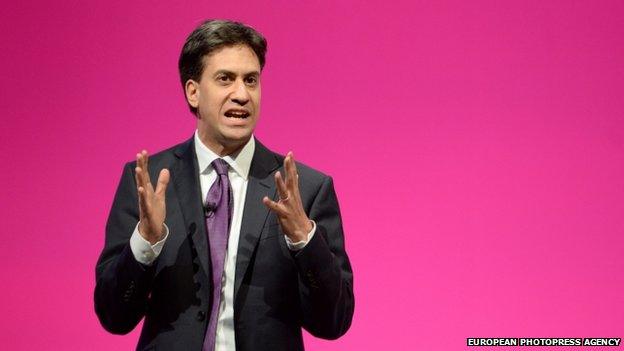Labour's Ed Miliband pledges to boost NHS spending
- Published

Labour leader Ed Miliband will pledge to increase spending on the NHS in England in his party conference speech on Tuesday, the BBC understands.
He will say a "mansion tax" on homes worth more than £2m will help pay for the extra funding.
Labour is currently refusing to comment on what it describes as "speculation".
The party has yet to spell out details of how its mansion tax would work. It could raise around £1.7bn a year, the Institute of Fiscal Studies (IFS) says.
The Liberal Democrats also propose a mansion tax, while the Conservatives have ruled out such a plan, saying it is "not sensible".
'Funding gap'
On Monday, shadow chancellor Ed Balls told the Labour Party conference in Manchester there would be no extra spending commitments "without saying where the money is coming from".
He said a mansion tax would be one of his top priorities in government, along with a rise in the minimum wage, a freeze in energy bills and scrapping what Labour calls the "bedroom tax" but the Conservatives call the ending of the "spare room subsidy".

But he pledged to continue the 1% cap on child benefit rises until 2017.
It is likely that Labour could allocate at least another £1bn a year to the NHS from other tax rises it has already announced.
Extra funding of around £3bn per year compares with a "funding gap" which NHS England recently warned could grow to £30bn by 2020-1 "if services continue to be delivered in the same way as now".
Others, such as the Nuffield Trust, have put the funding gap at £6bn a year by the end of the next parliament, in 2020.
In the past Labour has said the mansion tax would be used to pay for introducing a new 10p rate of income tax. However, in his conference speech on Monday, shadow chancellor Ed Balls said that abolishing the Married Tax Allowance would pay for that measure.
The party has ruled out introducing a new tax on working people to pay for the NHS in response to those who have argued for a repeat of Gordon Brown's 1% increase on national insurance to pay for health in 2001.
Strictly speaking Labour does not need to spell out what tax rise will pay for more NHS spending, since it is proposing to borrow more than is allowable under the coalition's economic plans. The IFS recently estimated that it could spend as much as £28bn per year more and still stick to its deficit and targets.
In their 2010 general election manifesto, the Liberal Democrats proposed a mansion tax based on 1% of a property's value above £2m.
Under this a property worth £3m would face a charge of £10,000 a year.
No firm costings are available for such a tax, but in 2010 the Lib Dems estimated that 70,000 properties would be affected and the total yield from this tax would be £1.7bn a year.
In 2013, David Cameron ruled out imposing a mansion tax. He told the BBC that "wealth tax is not sensible for a country that wants to attract wealth creation, wants to reward saving and people who work hard and do the right thing".